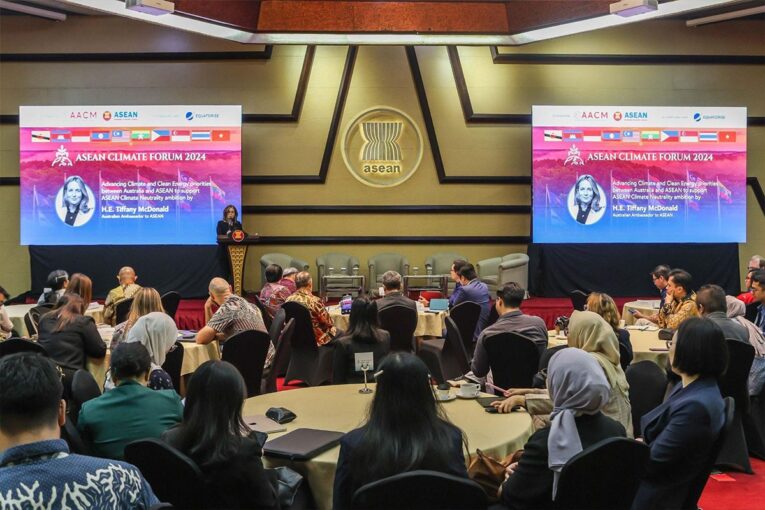
Jakarta, Indonesia – December 5, 2024 – The ASEAN Climate Forum returned to the home of ASEAN this year, hosted at the ASEAN Hall of the ASEAN Secretariat in Jakarta, Indonesia.
Organized by the ASEAN Alliance on Carbon Markets (AACM) and the ASEAN Business Advisory Council (ASEAN BAC) in collaboration with Equatorise Advisory, the forum convened over 100 business leaders, policymakers, and senior experts in sustainability and climate from across the region. The discussions centered on two pivotal themes for ASEAN’s climate and net-zero progress: carbon markets and cross-border green energy cooperation.
Opening Segment: Leadership in Climate Action
The forum commenced with opening remarks from esteemed leaders:
Steven Marcelino, Deputy Chair for International Affairs at AACM and Managing Partner and CEO of Equatorise, highlighted the forum’s focus on unlocking growth through carbon markets and advancing cross-border green energy cooperation, while also showcasing Malaysia’s ASEAN-BAC chairmanship in driving sustainability.
Dharsono Hartono, Permanent Chair of AACM, Vice Chair of Environment at KADIN Indonesia, and CEO of PT RMU, who emphasized ASEAN’s unique potential to lead in carbon markets, leveraging its natural resources and biodiversity to unlock significant economic benefits while addressing decarbonization challenges.
Tan Sri Nazir Razak, Chair of ASEAN BAC Malaysia and Founding Partner of Ikhlas Capital, reaffirmed Malaysia’s commitment to prioritizing carbon markets during its ASEAN Chairmanship in 2025, including spearheading initiatives like the ASEAN Common Carbon Framework to promote equitable growth.
H.E. Nararya S. Soeprapto, Deputy Secretary-General of ASEAN for Community and Corporate Affairs, delivered a special address on ASEAN’s climate neutrality ambitions, emphasizing the role of carbon markets in low-carbon growth.
H.E. Tiffany McDonald, Australian Ambassador to ASEAN, underscored Australia’s support for advancing ASEAN’s climate and clean energy goals.Bernardino M. Vega, Alternate Chair of ASEAN-BAC Indonesia and CEO of Adakami, emphasized the forum’s role in uniting industry leaders, policymakers, and experts to drive the green transition and position ASEAN as a global leader in sustainable development.
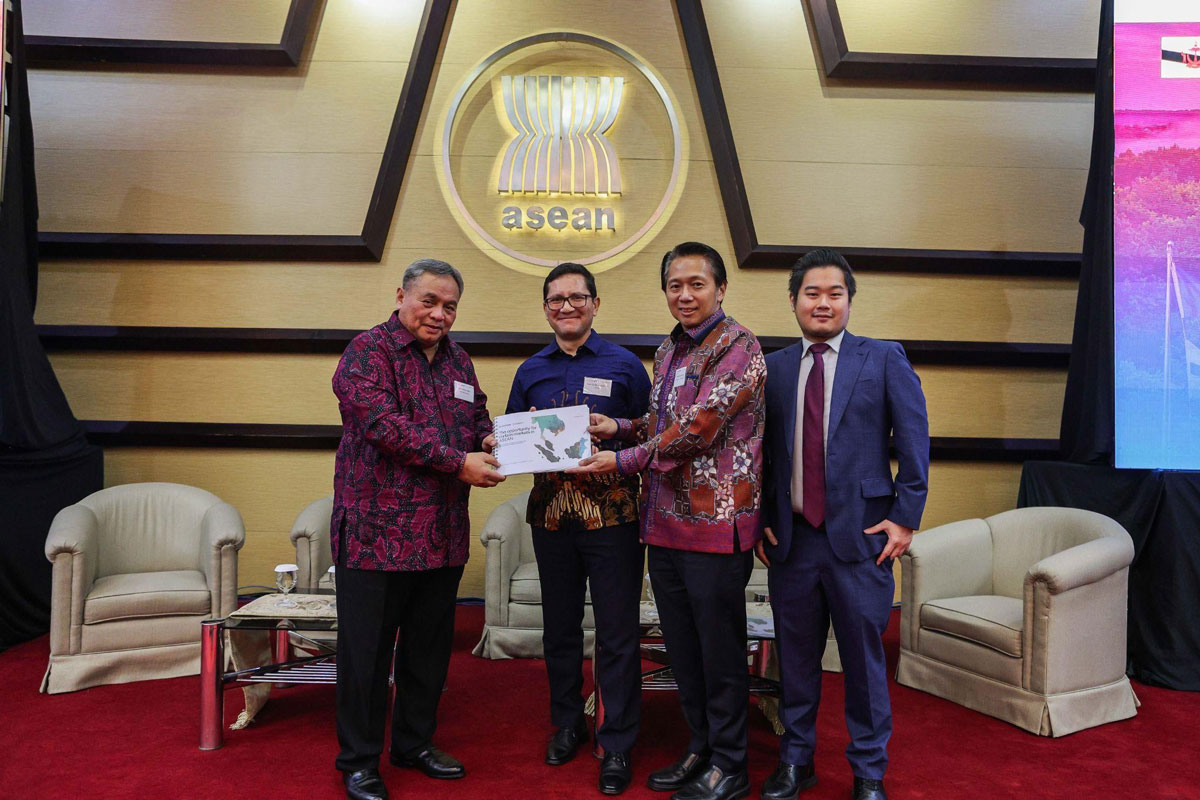
During this segment, AACM and Abatable launched the Opportunity for Carbon Markets in ASEAN report. Juan Carlos Arredondo Brun, Director of Knowledge, Policy & Advocacy at Abatable, presented key findings, highlighting the immense economic and environmental potential of carbon markets in the region:
For more information, download the full Opportunity for Carbon Markets in ASEAN report.
Segment 1: Unlocking New Growth Engines Through Carbon Market Development in ASEAN
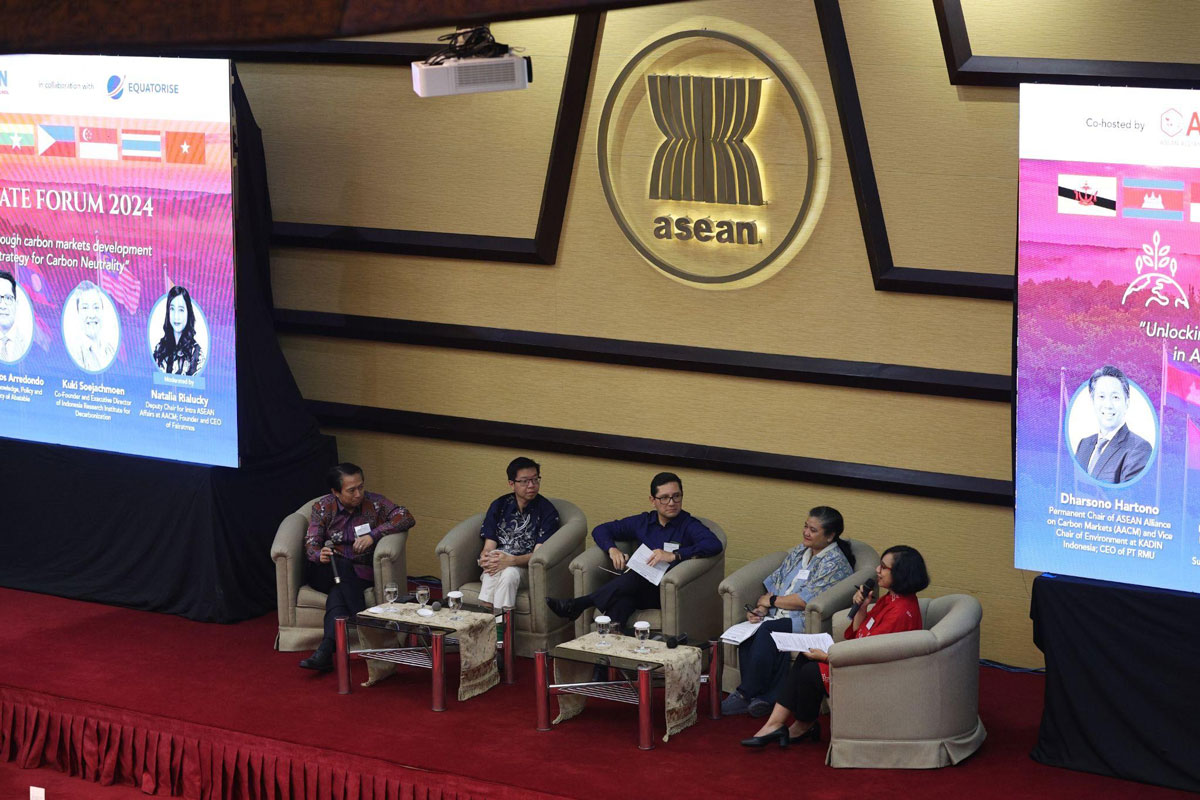
The first segment, focused on advancing ASEAN’s strategy for carbon neutrality, began with a keynote presentation by Dr. Renard Siew, President of the Malaysia Carbon Market Association (MCMA) and Group Head of Corporate Sustainability at Yinson Holdings. Dr. Siew provided an update on the ASEAN Common Carbon Framework, highlighting a recently signed Memorandum of Collaboration among four ASEAN carbon alliance entities at COP29, signifying a major step forward in regional carbon market alignment.
The subsequent panel discussion, moderated by Natalia Rialucky, Deputy Chair for Intra-ASEAN Affairs at AACM and Founder and CEO of Fairatmos, delved into critical issues such as the roles of governments and private sectors in scaling carbon markets, strategies for harmonizing ASEAN’s diverse Nationally Determined Contributions (NDCs) to create a unified carbon market, and ensuring the integrity of carbon credits to prevent greenwashing.
Key takeaways from the panel included the necessity of localized methodologies tailored to ASEAN’s unique contexts to address challenges and unlock bottlenecks. The discussion highlighted significant barriers, such as high costs for Nature-Based Solutions (NBS) and delays in project approvals, stressing the urgency for clear priorities and readiness signals for international cooperation.
The panel further emphasized the importance of evolving NBS through robust valuation frameworks and active government support to drive sustainable development. Additionally, ensuring high integrity in carbon markets was identified as critical, with a strong call for reliable data and harmonized methodologies to build trust and enhance the effectiveness of regional initiatives.
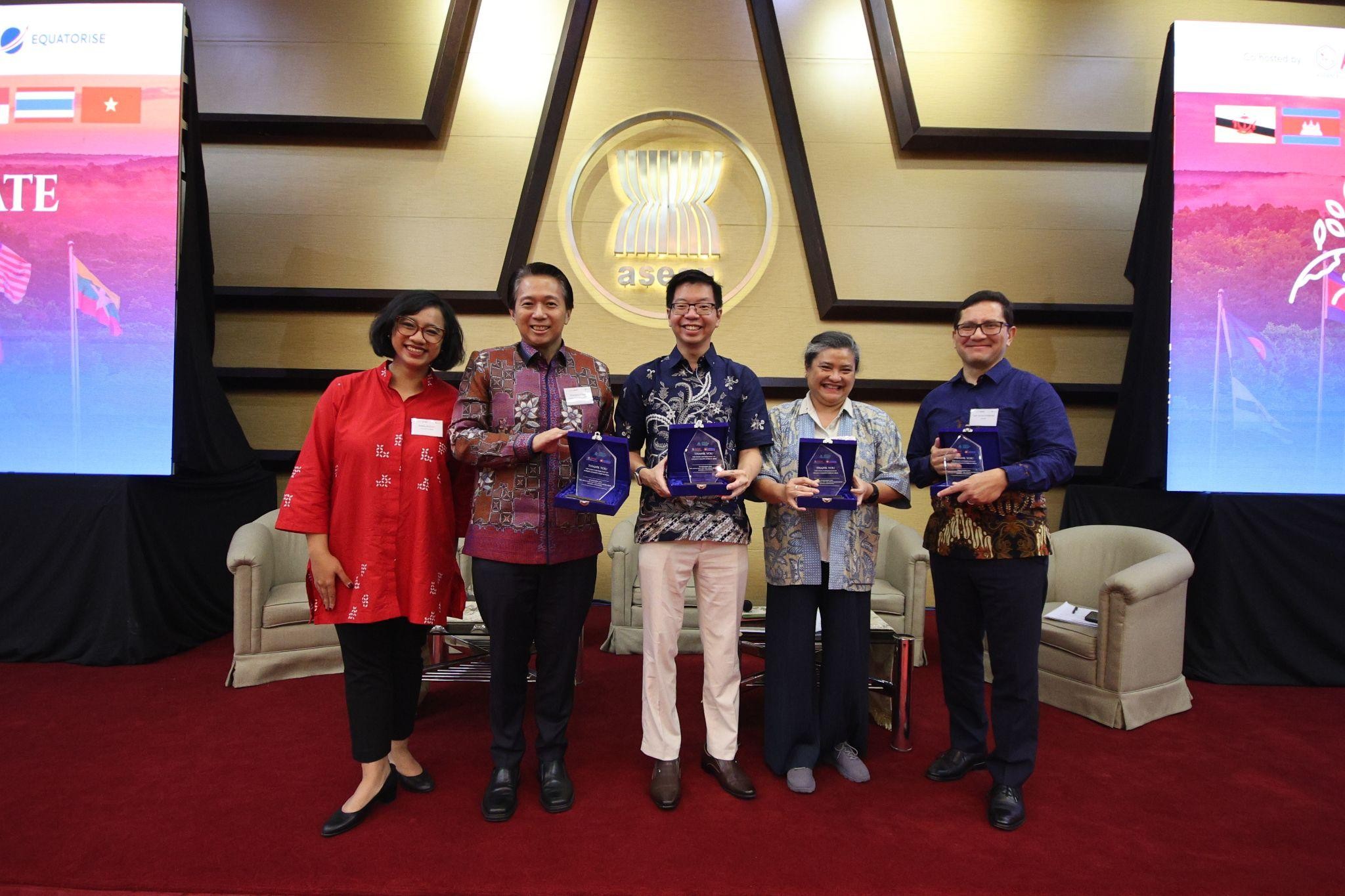
Segment 2: Mainstreaming Cross-Border Green Energy Cooperation in Southeast Asia
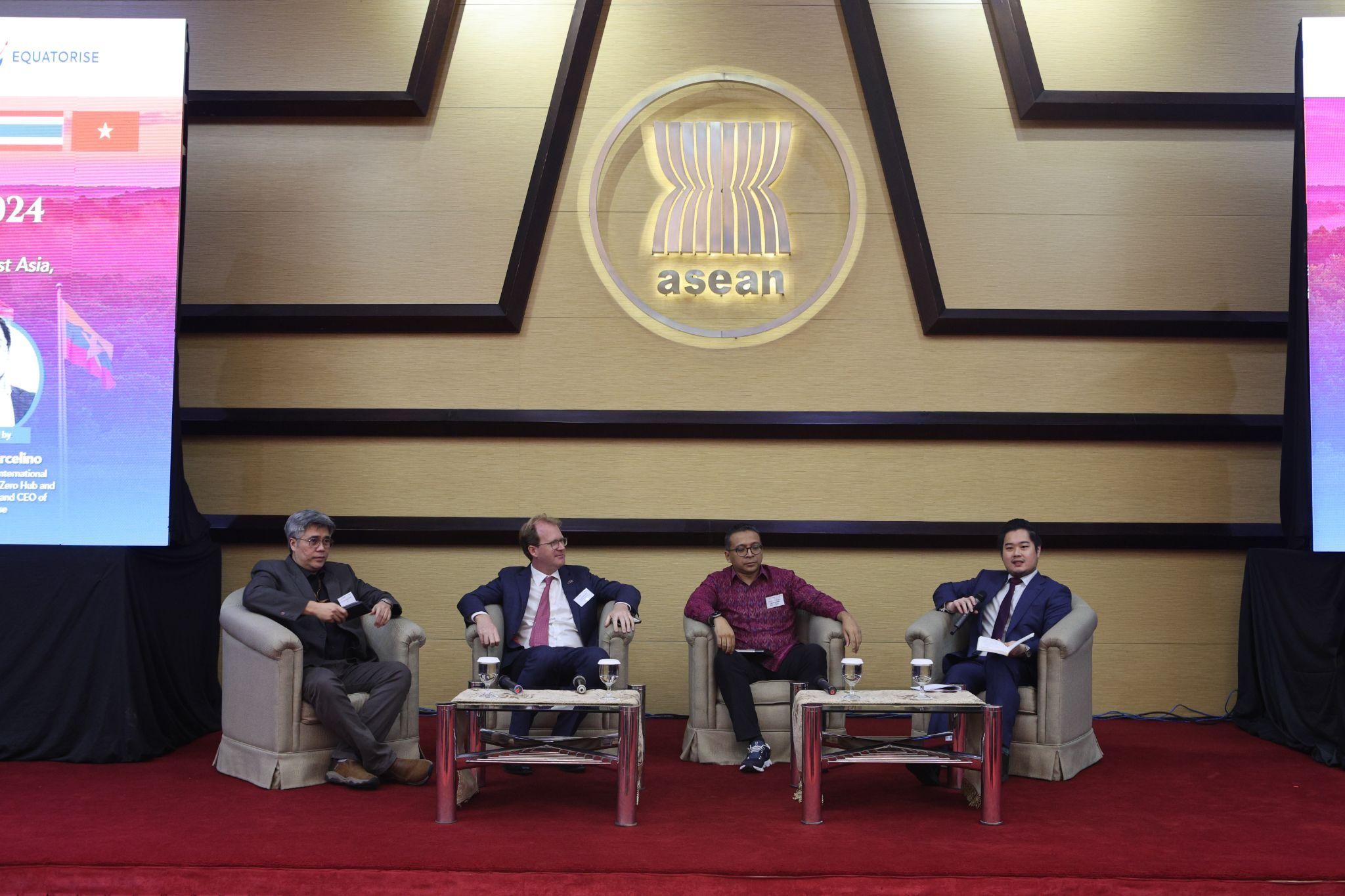
The second panel, moderated by Steven Marcelino, Deputy Chair for International Affairs at Kadin Net Zero Hub and Managing Partner and CEO of Equatorise, explored strategies for advancing cross-border green energy cooperation in Southeast Asia, leveraging the region’s strengths in critical minerals.
Key discussions addressed ASEAN’s need to overcome policy and infrastructure challenges to enhance regional energy connectivity, the role of blended finance in accelerating energy transitions, and the development of a sustainable critical minerals supply chain to support green energy initiatives.
Panelists emphasized the importance of ASEAN leapfrogging traditional energy transitions by prioritizing interconnected smart grids and microgrids to drive clean energy systems. Dr. Nuki Agya Utama of ERIA highlighted that strong policies and regional collaboration are essential to achieving this vision.
The panel also underscored the evolving role of the private sector in renewable energy innovation, with Dharma Djojonegoro of Adaro Power showcasing transformative projects like floating solar in Batam as examples of the innovations needed to meet climate challenges.
Furthermore, Gustaaf Reerink from the EU-ASEAN Business Council affirmed Europe’s readiness to provide technical and financial support for ASEAN’s green energy initiatives. However, he stressed the critical need for addressing policy inconsistencies and infrastructure gaps to ensure the viability and success of cross-border energy projects.
The panel collectively highlighted the urgency of regional cooperation and innovation in achieving a sustainable and interconnected energy future for ASEAN.
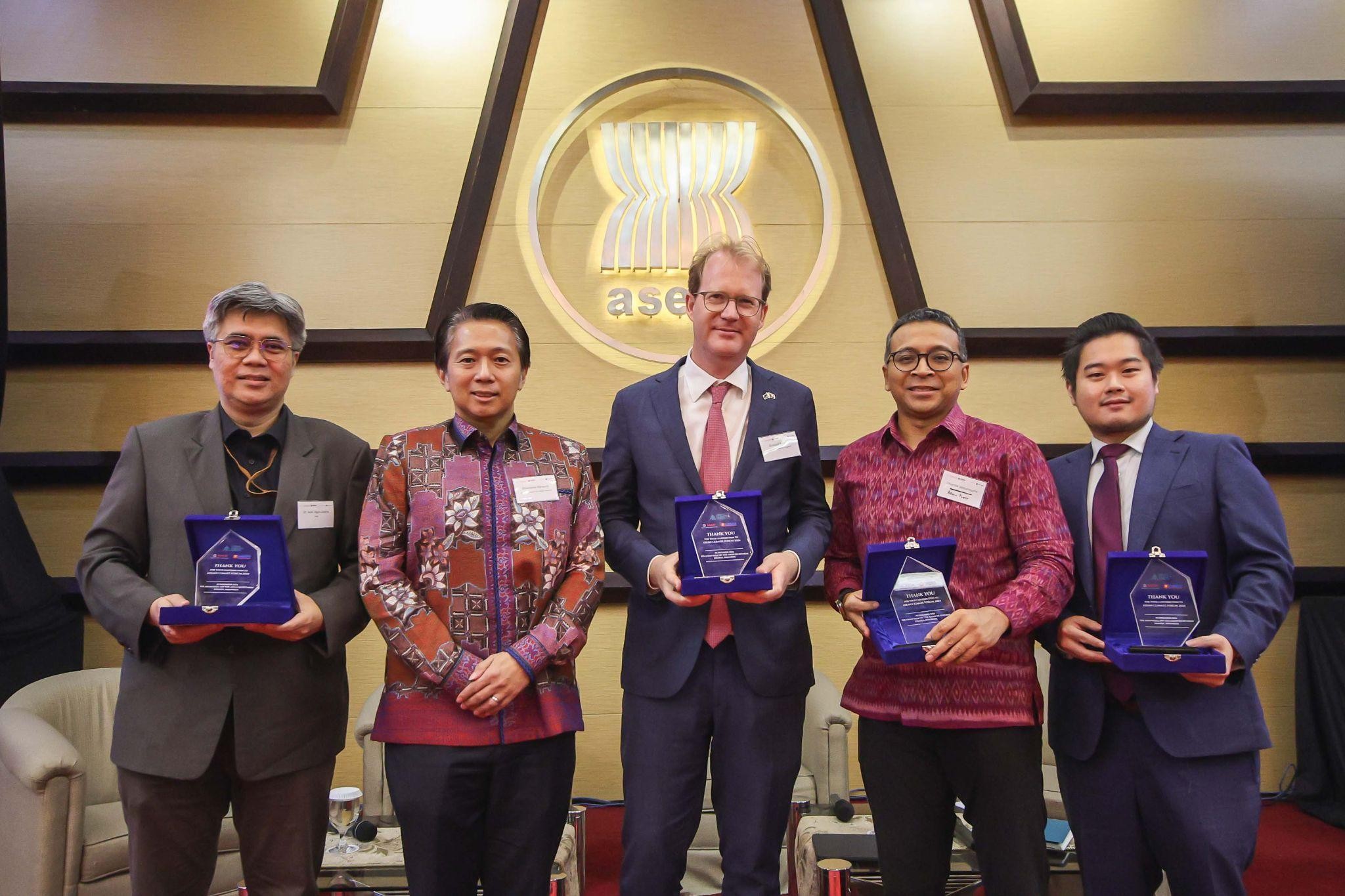
Dr. Renard Siew, President of Malaysia Carbon Market Association said,
“Localized methodologies are critical to our success. In Malaysia, developing our own protocols and aligning with other ASEAN standards can help unlock bottlenecks and improve project feasibility. We need mutual recognition frameworks and capacity-building programs to ensure all ASEAN nations can participate effectively in carbon markets.”
Juan Carlos Arredondo Brun, Director of Knowledge, Policy & Advocacy of Abatable said,
“ASEAN nations need to clearly signal their priorities. International markets are watching to see how willing we are to participate and invest in compliance and voluntary mechanisms. Policy clarity will attract investment and enable ASEAN to integrate carbon markets with international standards.”
Dharsono Hartono, Permanent Chair of ASEAN Alliance on Carbon Markets said,
“Nature-based solutions were undervalued for years because we lacked the frameworks to calculate their true worth. Now, with government support, we can build robust compliance markets. High-integrity voluntary carbon markets require public trust. ASEAN leaders must endorse these markets and build awareness of their benefits.”
Kuki Soejachmoen, Co-Founder and Executive Director of Indonesia Research Institute for Decarbonization said,
“Nature-based solutions like REDD+ and biochar can drive emissions reductions and support rural communities. Integrity is key. Without reliable data and harmonized methodologies, we risk undermining trust in the market and losing opportunities for global collaboration.”
Dr. Nuki Agya Utama, Director for Energy Policy and Head of the Asia Zero Emission Center at ERIA said, “ASEAN must leapfrog traditional energy transitions. With strong policies and regional cooperation, we can move towards interconnected smart grids and microgrids to support clean energy.”
Gustaaf Reerink, Executive Board Member of EU ASEAN Business Council and EuroCham Indonesia; Foreign Counsel at ABNR Counsellors at Law said, “Europe is ready to provide technical and financial support. But ASEAN must address policy inconsistencies and infrastructure gaps to make cross-border energy projects viable.”
Dharma Djojonegoro, Head of Permanent Committee of Investment on Green Economy Affairs at KADIN Indonesia; CEO of Adaro Power said, “Adaro’s decision to split into two entities—thermal coal and renewable energy—is a testament to how businesses are evolving to meet climate challenges. Floating solar in Batam is just one example of innovation we need to scale.”
The forum’s discussions highlighted the urgency and potential for ASEAN to lead in regional sustainability efforts. By scaling carbon markets, advancing renewable energy innovation, and fostering international collaboration, ASEAN can not only meet its climate goals but also unlock substantial economic and social benefits for the region.